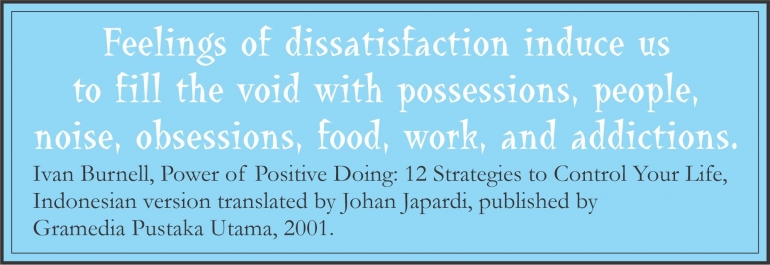Jeffrey Sachs seemed to me very "Eastern" when he opined as follows:
"Similarly, though the United States is one of the world's richest economies by per capita income, it ranks only around seventeenth in reported life satisfaction. It is superseded not only by the likely candidates of Finland, Norway, and Sweden, which all rank above the United States but also by less likely candidates such as Costa Rica and the Dominican Republic. Indeed, one might surmise that it is health and longevity rather than income that give the biggest boost to reported life satisfaction. Since good health and longevity can be achieved at per capita income levels well below those of the United States, so too can life satisfaction. One marketing expert put it this way, with only slight exaggeration: Basic Survival goods are cheap, whereas narcissistic self-stimulation and social-display products are expensive. Living doesn't cost much, but showing off does."
Jeffrey D. Sachs, The Price of Civilization
I agree with Jeffrey on this and I feel very grateful that I did not get caught up in the show-off lifestyle mentioned above. In fact, Indonesian wisdom has taught and reminded us to place sandang, pangan, papan (clothing, food and shelter) as priorities in living our lives. "Needs" outside of these three are actually more towards "showing off". We have also been equipped with other Indonesian wisdom, "Jangan besar pasak dari tiang" ("Don't get bigger pegs than poles"/bigger expenses than income) and Javanese wisdom "nrimo" (acquiescent to one's fate) which, among other things, can be manifested as "much is insufficient, little is enough," we just need to adjust our expenses according to income.
Unfortunately, only God knows what causes some people to "run away from focus," from "fulfilling needs" to "fulfilling wants," so that they are more concerned with "showing off" than basic needs. I have observed that this is a process of change that alters human habits, and eventually people feel more comfortable being in the "show-off zone."
Humans are creatures of habit, but habits can be changed.
I've seen someone with a mediocre salary made purchases on credit for things ranging from electronics and household furniture, a cell phone, to a motorbike. As a result, the person was always in the position of "1 month behind." I mean, to cover all the installments, she had to cash borrow from the office, a few days after her monthly paycheck, and nobody knew how she could have several credit cards to support her lavish life-style.
There are people who made jokes about this insufficient salary as follows:
If asked to choose, which would you choose, the salary of 12 pas (just enough), or 8 koma? (comma, Indonesian used comma instead of point as a decimal separator). The friend who was questioned thought that the unit of number mentioned was in millions of Rupiah, and only realized when the friend who asked him answered his own question: "12 pas means that after the payday, the money can only last until the 12th (of the month), while 8 koma means that after the payday, on the 8th you are already in a coma."
Notes: koma in Indonesian can either mean comma or coma.
In a situation that is more or less like the two salary schemes above, there are people who reduce their food intake and with a very limited money they are even more concerned with topping up their cellphones. In the term of the people of North Sumatra: BIMAS/Biar mati asal steady (Die in style/showing off). How ironic.
For me, being extravagant, once in while, not as a habit, is still not a problem. Extravagant in the sense of not getting into debt to support a lifestyle (that's called lavish), so it means occasionally spending extra money, but still within the limits of your ability to make money.
The show-off lifestyle which is identical with being lavish permeates not only Westerners, but also Easterners, not only those with sufficient income, but also those with minimal income. Let's use Indonesian reasoning and wisdom so that we don't fall into the same hole!
I will give an example here, about Mr. and Mrs. Gember, fictional characters in my humorous story, Makmur and Santun (their sons):
Note: Gember means Gembel Berada (a "rich" man with the mentality of a beggar).
Mr. Gember is a CEO at a medium-sized company, has a large two-story house, but:
1. There are no domestic workers who feel at home working in that house, because the salary is very low, and the work is very hard. The work at that house should be done by at least 2 domestic workers, but rather than hiring 2 domestic workers, Mr. and Mrs. Gember prefer to repeatedly hiring another new domestic worker.
2. At his house, Mr. Gember has a swimming pool which was originally used by his children, but over time, the swimming pool is left neglected and mossy, with the excuse that "they don't have time to clean it" and that the cost of replacing the water is very expensive.
3. Eventhough living in such a big house, but Mrs. Gember's monthly money is always barely enough, most of the time even not enough, and in order to maintain her lifestyle, Mrs. Gember, who finds it extremely difficult to get more money from her supermiser husband, is forced to exchanged her dignity with receiving "compensation" from some of her friends who are "the real crazy rich."
4. The children of this family, especially Makmur, in his growing age, eats more and more, that he has to get rid of his shame and owes his daily lunch in the school canteen. Mr. Gember, who was told by his wife and asked to increase the daily allowance money for Makmur, just replies lightly: "Just pay the debt at the canteen."
5. Meanwhile .................
The Gembels has routine weekly expenses that cannot be negotiated: large flower boards, whether as a token of grief or joy, of course with their big names arranged on the boards.
6. And a myriad other examples.








